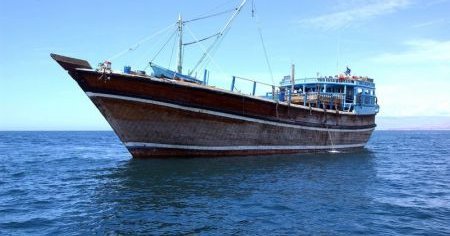The ESDP mandate focuses on solving the piracy problem on the sea, contradicting ESDP’s tradition of providing a holistic crisis management approach. What makes the EU adapt an approach, which solely focuses on the effects, but not the causes? This operation will challenge the EU to effectively guard 3.000 km of coastline and thousands of squarekilometers of open water with a handful of battleships and airplanes. The answer is hidden in the question: what it would actually take to apply holistic crisis management tools to the Somalia region.
Freeway for pirats in a vital Western energy supply route
Pirate activity in the Gulf of Aden has been increasing for the last several years. Since the civil war of 1991 Somalia has tumbled deeper into chaos. There is no administration, national police or army that could fight criminals. Defining criminals in this situation is a challenge itself. The current administration, backed by Ethopian forces, clashes with Islamic groups and does not have an effective hold on the country.
Leaving their hideouts Eyl, Harardhere or Garowe in Somalia’s region Puntland the pirates detect and hijack vessels up to 800 km off the coast. According to Noel Choong, director of theinternational maritime bureau, 94 vessels have been attacked since January 2008 and 38 have been captured. Due to international inactivity, the pirates became more daring, hijacking more and more vessels and take them into their hideouts. Ships and crews are only released in return for high ransoms. Despite the fact that two-thirds of the ships can avoid being captured, the pirates commit sensitive strikes on one of the world’s most important economic aortas and a vital Western energy supply route.
The EU joining in the struggle
An international response was inevitable and several solutions were presented. After the capture of an Ukrainian freighter, transporting weapons and tanks, Russia sent the frigate “Neustraschimi” into the area. NATO protects UN convoys of the World Food Programme, and France provides secured convoys for vessels passing by the Gulf of Aden. However, given the vast region this support might not be enough. Slowly but surely private security firms such as Blackwater and Drum Resources fill in the lack of security by escorting vessels through the Gulf of Aden for $50.000 per day.
ESDP’s mandate is designed to protect merchant vessels and take over the convoying of ships of the World Food Programme from NATO. All actions taken provide for an off-coast mission with a handful of frigates and airplanes, which can only cover 2% of the region at the same time. Considering all these facts, is the mission to be regarded as an operation of symbolic character, a signal to the pirates that they will have to face the consequences when continuing their operations? Certainly this is one aspect of the situation.
Furthermore, what would be an alternative? Among others, Pentagon press secretary Geoff Morrell points out the piracy problem “requires a holistic approach from the international community at sea, ashore, with governance, with economic development." [1]
Somalian statehood at stake
A full-scale nation-building mission would be necessary to merely get near the goal of establishing Somalian statehood. Europe would get caught between the interests of several conflict parties, with a high chance, that after years of engagement the mission will fail, not to mention the resources spent invanely. Somalia is not the Balkan area within a comfortable distance to the EU. Even without the financial crisis a nation-building mission in Somalia would be risky adventure, almost impossible to afford.
This is why it is not surprising the EU decided for a limited off-coast operation, even if this approach will fight the pirate-syndrome at best, but never its causes. It suits ESDP well to accept its limited resources and adapt a realistic conflict perception. The ESDP mission alone will prove to be insufficient to get rid of piracy.
However it might be one step towards solving the dilemma. For the time being, ESDP will operate heavily underressourced in this area. This is why the few forces must operate with maximum effect. France is providing for irregular convoys through the Gulf of Aden with so called protection groups. However, due to limit number of soldiers, only two ships in a convoy can use that protection groups so far. This service of save transit between two checkpoints on open sea could be enhanced to more regular convoys and a larger number of protection teams. Additionally other frigates patrol the same area to support sinlge merchant and civililan vessels, if necessary.

Follow the comments: |
|
